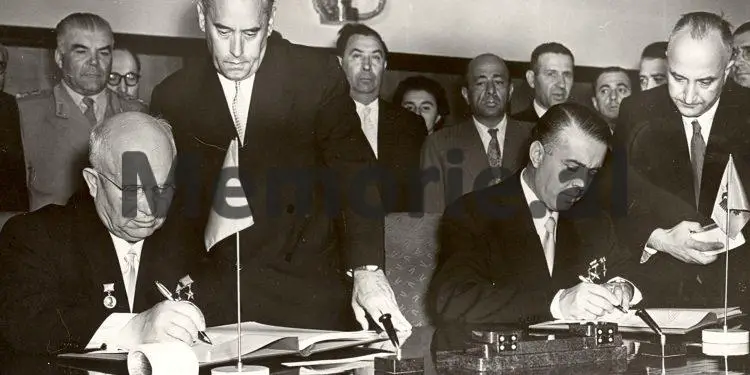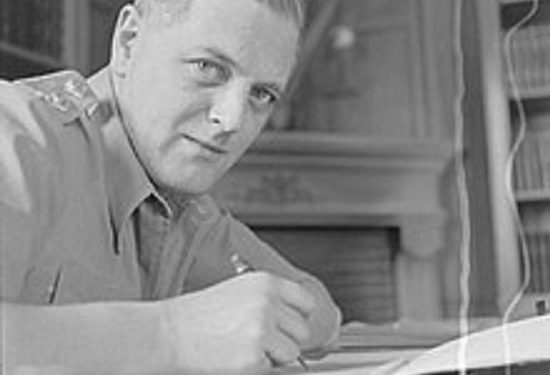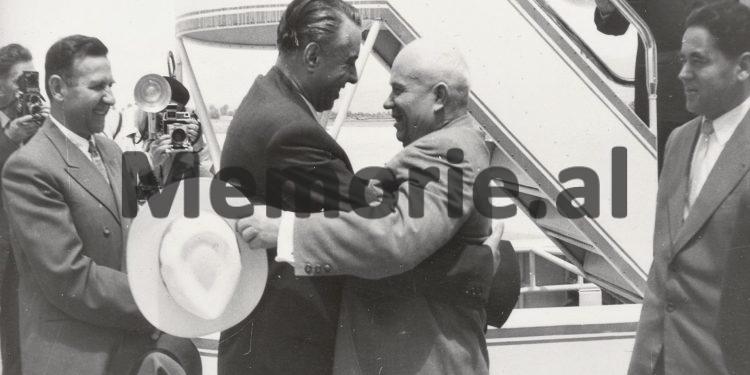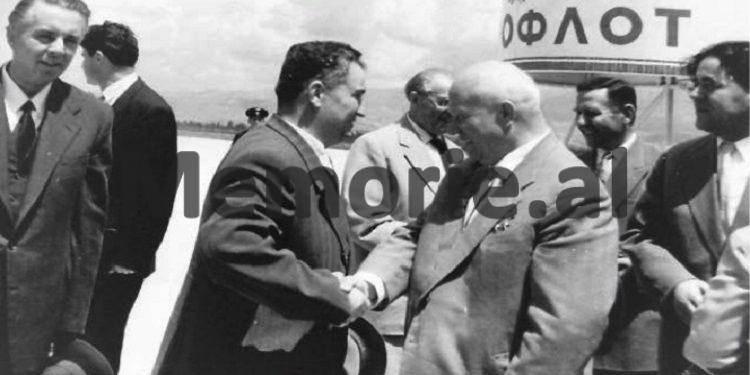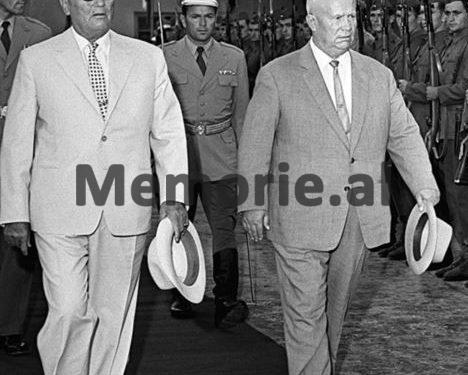By Fatos Veliu
Second part
Memorie.al / In May 1959, an urgent telegram from Tirana informed him that he had to urgently return to Albania. Agim Popa, the philosophy student, realized that something big had happened, but he would only understand the true significance of that telegram upon arriving in the capital. In the Central Committee of the PPSh, they would communicate with the appropriate pomp that he had been entrusted with the task of the main translator during Nikita Khrushchev’s visit to Albania. In this interview, Mr. Popa, among other things, also testifies for the first time what were the statements and ironies of Khrushchev, behind the scenes, with the then high leaders of communist Albania, during the two-week visit he made to Albania, visiting Shkodra, Korça , Vlorë, Butrint, etc., the aggravated situation during the Meeting of the 81st Communist Workers’ Parties in Moscow, where Khrushchev and his supporters, such as the head of the Communist Party of Spain, Dolorez Ibarruri (“The Passionate”) and Wlodislav Gomulka of Poland, burst into insults and accusations during Enver’s speech, caution and fear in the embassy premises from eavesdroppers, until the trip with the “Quin Elisabet” steamer to New York, where the meeting of the UN General Assembly would take place, where the Albanian delegation, it was headed by the prime minister, Mehmet Shehu with Nesti Nasen, and Josif Broz Tito and Winston Churchill’s son, Randolph, who asked to meet Mehmet Shehu, also traveled on board that trans-oceanic ship!
Continues from last issue
The strange gesture of Enver Hoxha, when he escorted Nikita Khrushchev to Rinas…!
During Nikita Khrushchev’s visit to Albania, apparently not only from the documents of the time but also from this confession of Agim Popa, such a situation must have been created: on the one hand, a feeling of alarm in Enver Hoxha and his collaborators in the high leadership of PPSh, on the other hand illusions of Nikita Khrushchev, for his authority and influence on the Albanians.
It must be said that the reception that was organized for Khrushchev in Albania took on the appearance of a true popular celebration, a reception that was never given to him even in the Soviet Union, even in the best moments of his popularity there. From such an expectation, he must have had the illusion that it would be enough for him to give the signal and the Albanians would rise up and overthrow Enver Hoxha. This is given even more clearly, during the works with the films made on the days of the visit.
Testimony of Agim Popa, Enver’s former translator at the Meeting of 81 Parties in Moscow, in 1961
“I was not in his escort at the airport on the day of his departure from Albania, because early that day, I left to return to Moscow on the plane carrying the gifts for Khrushchev. But there was an interesting moment. In Moscow for the visit In Albania, a documentary film was prepared, the text of which was translated and read by me in the Albanian language.
During a working session for the film, when the sequences of Khrushchev being escorted to the airport were being shown, the film’s director, who, like me, was unaware of the internal friction between the Albanian leadership and Khrushchev, said: “I don’t like the presentation of Comrade Enver’s figure at the moment of take-off. He made a gesture as if he was freed from something.”
With the fine eye of the artist, he was able to capture the psychological state of Enver Hoxha in these moments”.
Mehmeti, did not meet Tito on the English trans-oceanic, “Queen Elizabeth”
The event that Mehmet Shehu had traveled on the same steamer with Tito, the son of Winston Churchill and Harry Fultz, was surprisingly revealed at the end of December 1981. Not only that, but he, (Mehmeti), in contrary to the then line of his Party and Enver Hoxha, he was accused of having held several very mysterious meetings, with those whom Albania recognized as its sworn enemies.
All this alarm was given by Enver Hoxha himself, precisely in 1981, when the longest-serving Prime Minister of Albania killed himself and was declared by his colleague of several decades, as an “enemy of the Party and the people”. That was enough for that news to receive an unprecedented sensation.
For the most part, as usual in such cases, everything said by the Party was absolutely believed, which served as one more accusation against the iron prime minister. But what is the indisputable truth of those days in June 1960, when Mehmet Shehu traveled to New York, with the trans-oceanic liner of the Kingdom of England?
Mr. Agim, you translated Mehmet Shehu in 1960 at the UN Assembly. How did the much-discussed story of that enigmatic journey begin?
It was June 1960. At the UN headquarters in New York, its important Assembly would be held, where the member states would participate in the rank of heads of state or prime ministers. From Albania, it was decided that Mehmet Shehu would lead the delegation. Mehmeti made a decision to speak Russian and not English in the Assembly, despite the fact that he knew it well.
I learned that as a translator, he would take me. At that time I was working in the apparatus of the Central Committee of the Labor Party, precisely in the group that had been set up for the struggle against modern revisionism, which was dependent on Ramiz Alia. Thus, we left for the long road, which would take more than a week to New York.
From Tirana, it was decided that our delegation would not travel with the Soviet steamer “Balttika”, with which all the delegations of the Soviet bloc countries would travel, but to go with the English and very modern transoceanic “Queen Elisabeth” Elizabeth).
On that steamer, we boarded the northern port of France, precisely that of Cherbourg. From the port, we learned that Marshal Tito himself would also travel on that steamer, who, like us, was going to the UN Assembly of in New York.
How many people were there in total in that delegation?
We all became 8-9 people. As I said, that delegation was headed by Prime Minister Mehmet Shehu. The Minister of Foreign Affairs, Behar Shtylla, also participated.
Were you given a reception on the steamer, since you were a high-level delegation?
There was no courtesy to speak of, as it was merely a means of travel, despite being a gigantic vessel, even at that time, the world’s largest passenger steamer, representing the Kingdom of England. As far as I remember, it must have been about 84 thousand tons, while there were not only 1,500 passengers but also 1,500 service personnel. First class tickets were booked for us there.
What can you say about the accusations against Mehmet Shehu, made by Enver Hoxha, that allegedly on that trip he had meetings with Fultz, Tito and Randolph Churchill, who were considered enemies of Albania?
Mehmet Shehu and Behar Shtylla were placed in a separate cabin, while the rest of us were in other cabins. Only at the port where we boarded, we learned that Tito and his delegation were also on that steamer, who was going to the same meeting of the UN Assembly. Also on the steamer, we learned that Randolph Churchill, Winston Churchill’s son, was also there.
There is a significant coincidence here, that precisely Churchill’s son, who was traveling on that steamer, during the War, had been the English representative near Tito’s headquarters in Yugoslavia. Meanwhile, we found out that Titoja was a guest of the Queen of England on the steamer.
What did this mean…?!
As the shipping company “Cunard” was supported by the English state, the steamer represented the Queen of England in the same way. Many dignitaries of state, when traveling with her, according to the preferences of the Kingdom, were considered special guests on that steamer.
Have you had a chance to see them?
Titoja was staying in a cabin which, I don’t know where it was, since it was a complete entrance on the next floor and was not even connected to the floor where we were located. We only saw him at lunch, when he went to the first-class passenger restaurant and, with his suite, ate at his head table, which was kept especially reserved for him.
In fact, when we Albanians passed, the people of his service watched us with a special attention, for security effect, to Marshal Tito. Next time, we couldn’t even watch it. I remember that with him at the table, among others, was Josip Gjergjia, who had been ambassador to Albania, before the breakdown of relations between our two countries. While Mehmet Shehu and Behar Shtylla, with their wish, were served in the cabin.
Did Mehmet Shehu move around the premises of the steamer?
It was definitely moving, and even humorous. For example, on one occasion he, taking a walk on deck, accompanied by all of us, laughing loudly said, “Here I am safer than ever, for it is not worthwhile to sink this whole steamer so gigantic and modern, to eliminate Mehmet Shehu. Then, here we also have Tito, so the guarantee becomes many times higher”.
It was understood that they were subtle signs of irony for the Yugoslav leader. But I would strongly emphasize, contrary to what has been said for years, that he never moved alone, nor was he avoided in any case by his team that accompanied him, that is, by us.
You said Churchill’s son was there too?
Yes it was. We watched him move through the corridors and decks. They said on the steamer that it was Randolph Churchill, the very son of Winston Churchill. He was in his 60s. Officially, he presented himself as a journalist.
Is it true that Mehmet Shehu met any of the personalities of that trip, as was accused by Enver Hoxha?
Absolutely not. Churchill’s son had requested a meeting with him, under the pretext of an interview he wanted to do, but he was refused the meeting. In this case, I was a witness myself, when Behar Shtylla, in charge of Mehmeti, called him on the phone and gave him a negative answer, saying that the prime minister did not have time to meet him. After that, the one from across the receiver bumped into him nervously. And that’s it.
Are you convinced that Mehmet hasn’t moved out of your sight?
I say this with all my mouth, that he, that is, Mehmet Shehu, has absolutely not avoided our eyes, in any case. He would get out of the cabin and we would sit together on the deck, walking. We escorted him to his cabin and we stayed in those rooms. Later I found out, even among the accusations I heard against Mehmet, that Harry Fultzi had also been on that steamer.
But we never saw it, and I’m not convinced that it really was. I know exactly that, for five days and five nights, while we were on that steamer, no meeting was held by Prime Minister Shehu, with anyone. I say this with many guarantees, due to the very fact that I was present on that trip.
In New York then, they welcomed us with ceremony, and they even escorted us with the police, just like they did with all the delegations of the communist countries, to create the idea that we were in great danger. Delegations from over 100 countries participated there, represented by their presidents or prime ministers, such as Tito, Khrushchev, Castro, who spoke very briefly, only 4-5 hours, etc.
Did you also translate Enver Hoxha at the meeting of 81 Parties in Moscow? What can you remember from those moments?
In Moscow, we found out around November 4th that the delegations were scheduled to participate in the November 7th celebrations. The PPSh delegation consisted of only four people: Enver Hoxha, Hysni Kapo, Mehmet Shehu and Ramiz Alia. There was also the team of advisers, translators and other service personnel.
I was in the working group, which included Foto Çami, Frederik Gjerazi, who was the main translator of the delegation, Myfit Mushi, Haxhi Kroi, etc. We would specifically deal with the materials that would be needed at the moment, as well as with various translations. There our delegation settled in a special villa in the “Lenin” hills, while we went to the embassy.
But this did not last long, because soon the relations between Enver and Khrushchev became too tense and the delegation, for security reasons, came to the embassy. In fact, in one case, when we had opened the materials, Enveri motioned for us to cover them because there were hidden cameras and eavesdroppers up to the ceiling.
When the meeting began, it was not without purpose that the Albanian delegation was placed next to the podium where the discussants spoke, who shook their fingers over Enver’s head whenever they criticized. The attacks against our delegation intensified significantly after Enver’s speech on November 16, when the Chinese had spoken on the 13th.
I was in the translation booth at the end of the hall, together with Frederik Gjerazi, at the moment when Enver Hoxha spoke, after we read his material in Russian, which we had prepared earlier. From there, I followed the reaction of the hall, especially Khrushchev’s ironic movements, while Enveri spoke.
After his speech, we followed everything that happened in that hall, sitting behind our delegation. When I followed what was happening in the hall, many times, we were put in difficult situations, from what we heard about the accusations made against the Albanian delegation and Enver Hoxha himself, as well as from Khrushchev’s ironic gestures.
Did you translate the material into Russian?
I was in the cabin together with Frederik Gjerazi. There, most of the material was read by Frederik in Russian (he was the first to translate it), while I read a part of it. We translated Enver’s speech from Albanian into Russian, while others in their booths translated from Russian into English, French and Spanish. From the (glass) booths where we were located, we had the opportunity to follow what was happening in the hall.
After Enver’s speech, when we sat in our chairs next to the delegation, we had a better chance to experience all that history that was happening there. Among those who spoke particularly harshly against the PPSh, after Enver Hoxha’s speech on November 16, were the head of the delegation of the Communist Party of Spain, Dolores Ibarruri, with the nickname “Pasionarja” and Wlodislav Gomulka, of the Communist Party of Poland, who called Enver Hoxha’s speech a speech of street people.
Enver Hoxha, in order to maintain his political position, openly positioned himself against Khrushchev
The excellent relations between Albania and the former Soviet Union suddenly began to freeze after the 20th Congress of the Communist Party of the Soviet Union. Everything further back was crystallized exactly at the Tirana district Party conference in 1956, where Albania was probably one of the only ones that did not support the democratic winds of that congress.
The Bucharest meeting, where the PPSh strongly positioned itself in support of the Communist Party of China, officially opposing Khrushchev, created an extremely difficult situation between the two communist countries that had begun an unprecedented clash.
Khrushchev’s visit to Albania in 1959 was a warning to the highest communist leadership of Albania at that time, about the fate that awaited our country, in case of non-submission to the general political line initiated by the Soviet Union, while there the favors they would have, in case of positioning in favor of that line, were also presented.
All events and diplomatic clashes between the parties were finalized at the famous Meeting of 81 Communist and Workers’ Parties from all over the world, where Enver Hoxha, not only with the severity he had shown until then, but with a strange stubbornness, presented the opposition of the party that he led, in front of all the countries that were almost in the same political coherence with Moscow.
This would cause, from that moment on, to expect a flood of insults and accusations, up to discredits. From that meeting, the immediate distancing between Moscow and official Tirana began, which was immediately concreted in the economic field. All the contracts signed with the Soviet super state were absolutely terminated, while the 1,500 students who were placed in Soviet universities and military academies were immediately returned to Albania.” /Memorie.al




